HA2032 - Financial Reporting: Regulation, AASB, and IFRS Impact
VerifiedAdded on 2023/06/07
|20
|3154
|343
Report
AI Summary
This report critically examines the regulation of financial reporting versus voluntary disclosure, highlighting the roles of accountants and policymakers. It analyzes the Australian Accounting Standards Board's (AASB) participation in global accounting standard-setting, specifically its adoption of International Financial Reporting Standards (IFRS). The report also explores why IFRS adoption isn't compulsory for IASB member countries. Furthermore, it includes a financial statement analysis of four ASX-listed retail companies—Harvey Norman, JB Hi-Fi, Woolworths, and Wesfarmers—focusing on owner's equity and changes in equity over four years. Finally, a comparative analysis of debt and equity capital across these companies is presented, providing a comprehensive overview of their financial structures. Desklib provides access to similar solved assignments and past papers.
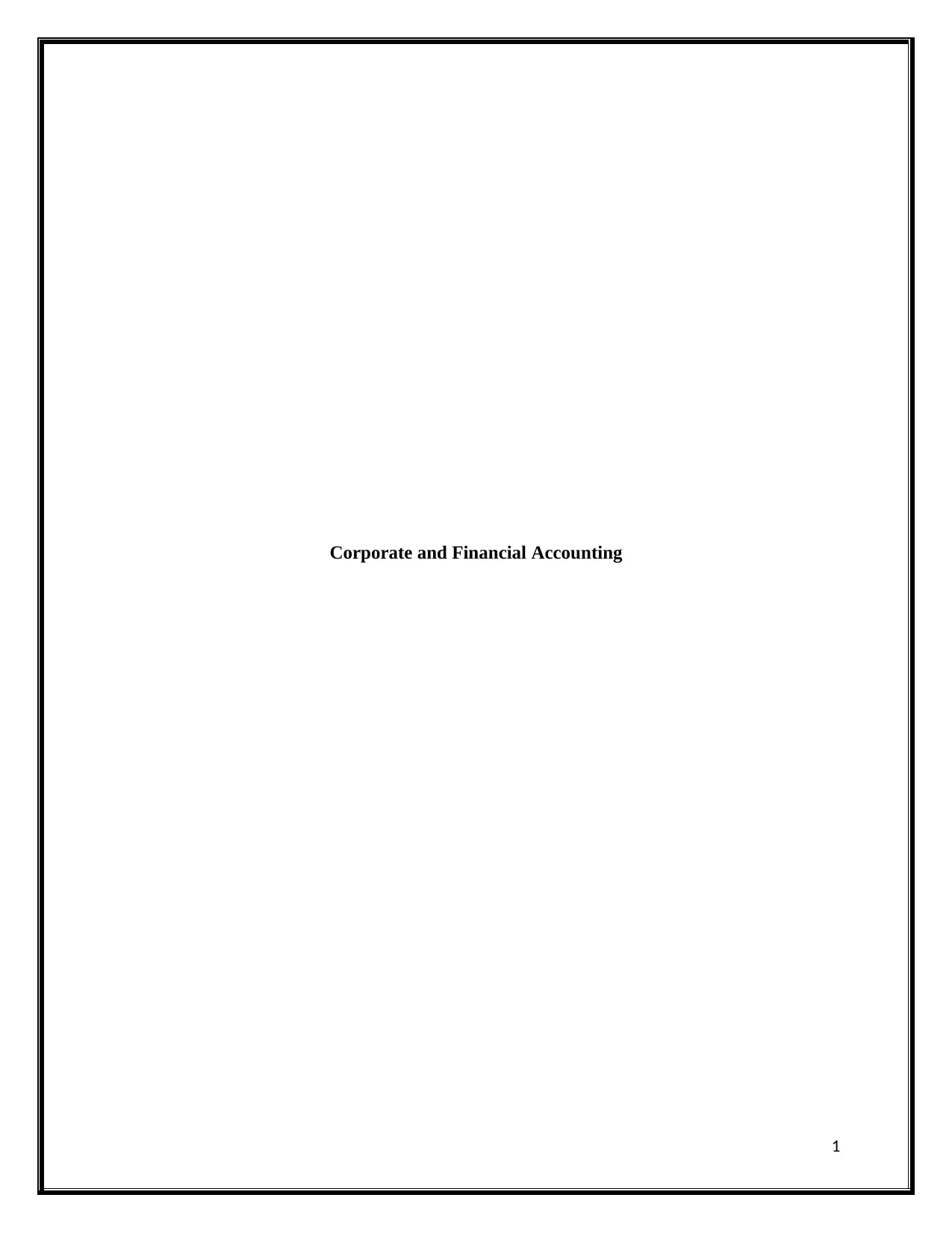
Corporate and Financial Accounting
1
1
Paraphrase This Document
Need a fresh take? Get an instant paraphrase of this document with our AI Paraphraser
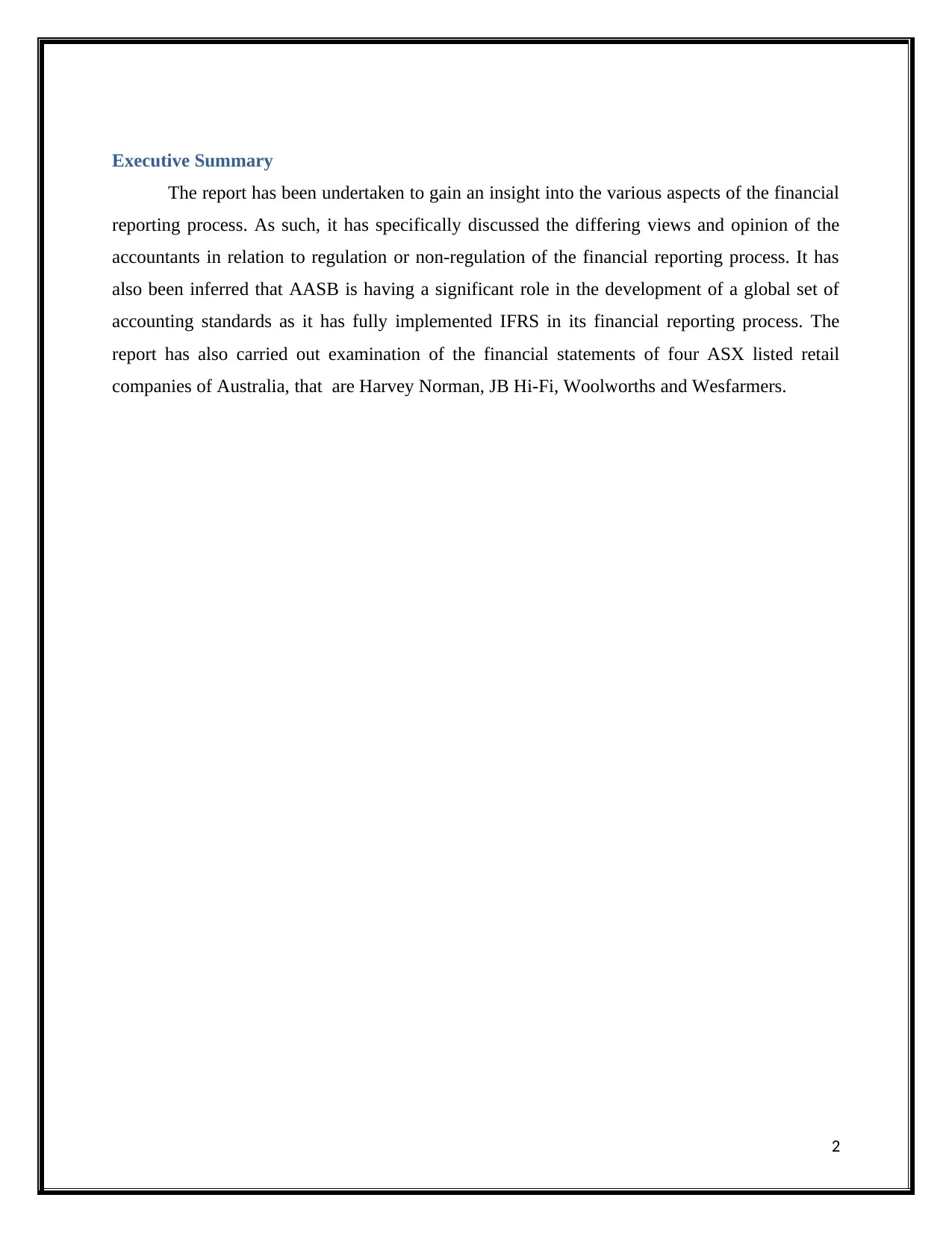
Executive Summary
The report has been undertaken to gain an insight into the various aspects of the financial
reporting process. As such, it has specifically discussed the differing views and opinion of the
accountants in relation to regulation or non-regulation of the financial reporting process. It has
also been inferred that AASB is having a significant role in the development of a global set of
accounting standards as it has fully implemented IFRS in its financial reporting process. The
report has also carried out examination of the financial statements of four ASX listed retail
companies of Australia, that are Harvey Norman, JB Hi-Fi, Woolworths and Wesfarmers.
2
The report has been undertaken to gain an insight into the various aspects of the financial
reporting process. As such, it has specifically discussed the differing views and opinion of the
accountants in relation to regulation or non-regulation of the financial reporting process. It has
also been inferred that AASB is having a significant role in the development of a global set of
accounting standards as it has fully implemented IFRS in its financial reporting process. The
report has also carried out examination of the financial statements of four ASX listed retail
companies of Australia, that are Harvey Norman, JB Hi-Fi, Woolworths and Wesfarmers.
2
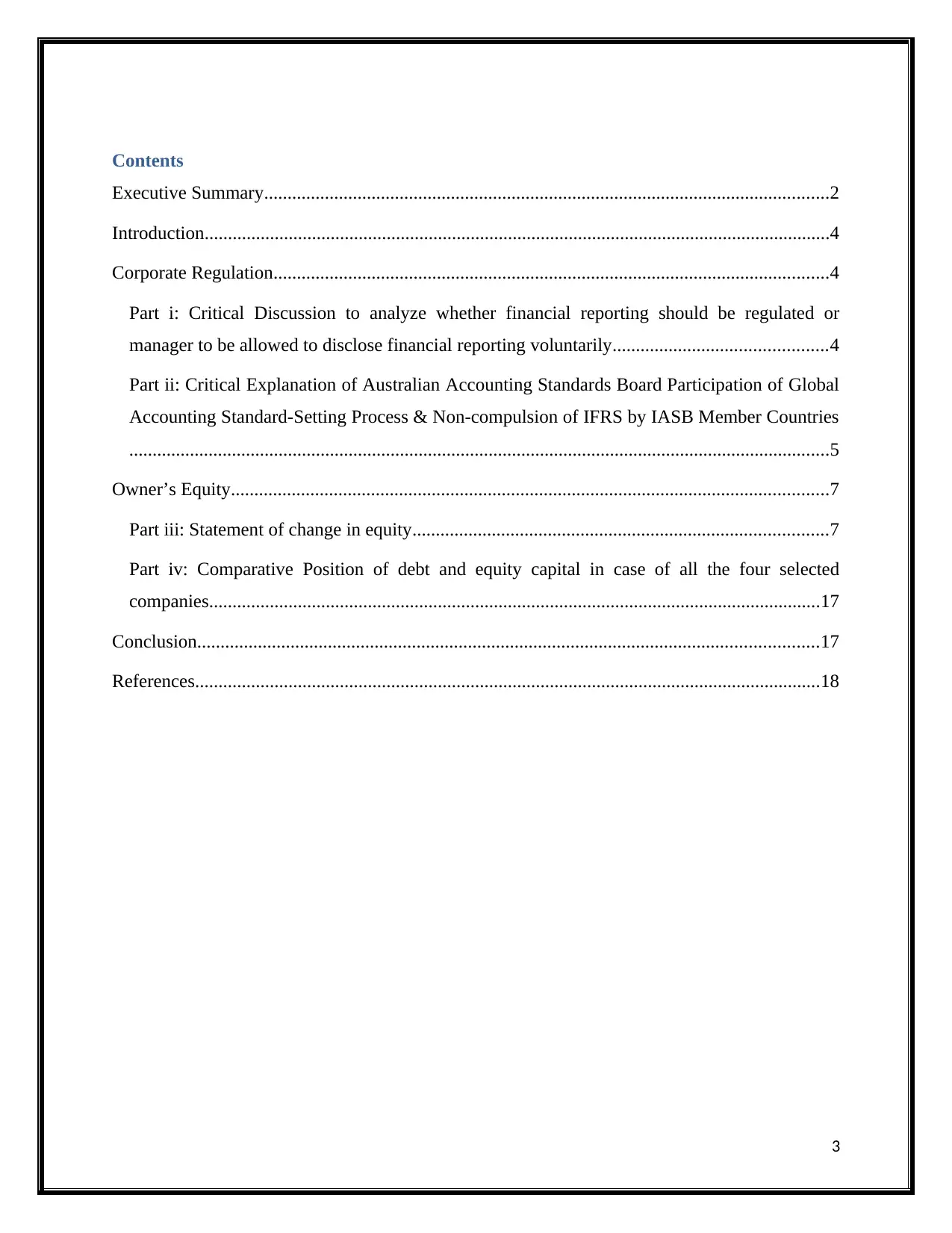
Contents
Executive Summary.........................................................................................................................2
Introduction......................................................................................................................................4
Corporate Regulation.......................................................................................................................4
Part i: Critical Discussion to analyze whether financial reporting should be regulated or
manager to be allowed to disclose financial reporting voluntarily..............................................4
Part ii: Critical Explanation of Australian Accounting Standards Board Participation of Global
Accounting Standard-Setting Process & Non-compulsion of IFRS by IASB Member Countries
......................................................................................................................................................5
Owner’s Equity................................................................................................................................7
Part iii: Statement of change in equity.........................................................................................7
Part iv: Comparative Position of debt and equity capital in case of all the four selected
companies...................................................................................................................................17
Conclusion.....................................................................................................................................17
References......................................................................................................................................18
3
Executive Summary.........................................................................................................................2
Introduction......................................................................................................................................4
Corporate Regulation.......................................................................................................................4
Part i: Critical Discussion to analyze whether financial reporting should be regulated or
manager to be allowed to disclose financial reporting voluntarily..............................................4
Part ii: Critical Explanation of Australian Accounting Standards Board Participation of Global
Accounting Standard-Setting Process & Non-compulsion of IFRS by IASB Member Countries
......................................................................................................................................................5
Owner’s Equity................................................................................................................................7
Part iii: Statement of change in equity.........................................................................................7
Part iv: Comparative Position of debt and equity capital in case of all the four selected
companies...................................................................................................................................17
Conclusion.....................................................................................................................................17
References......................................................................................................................................18
3
⊘ This is a preview!⊘
Do you want full access?
Subscribe today to unlock all pages.

Trusted by 1+ million students worldwide
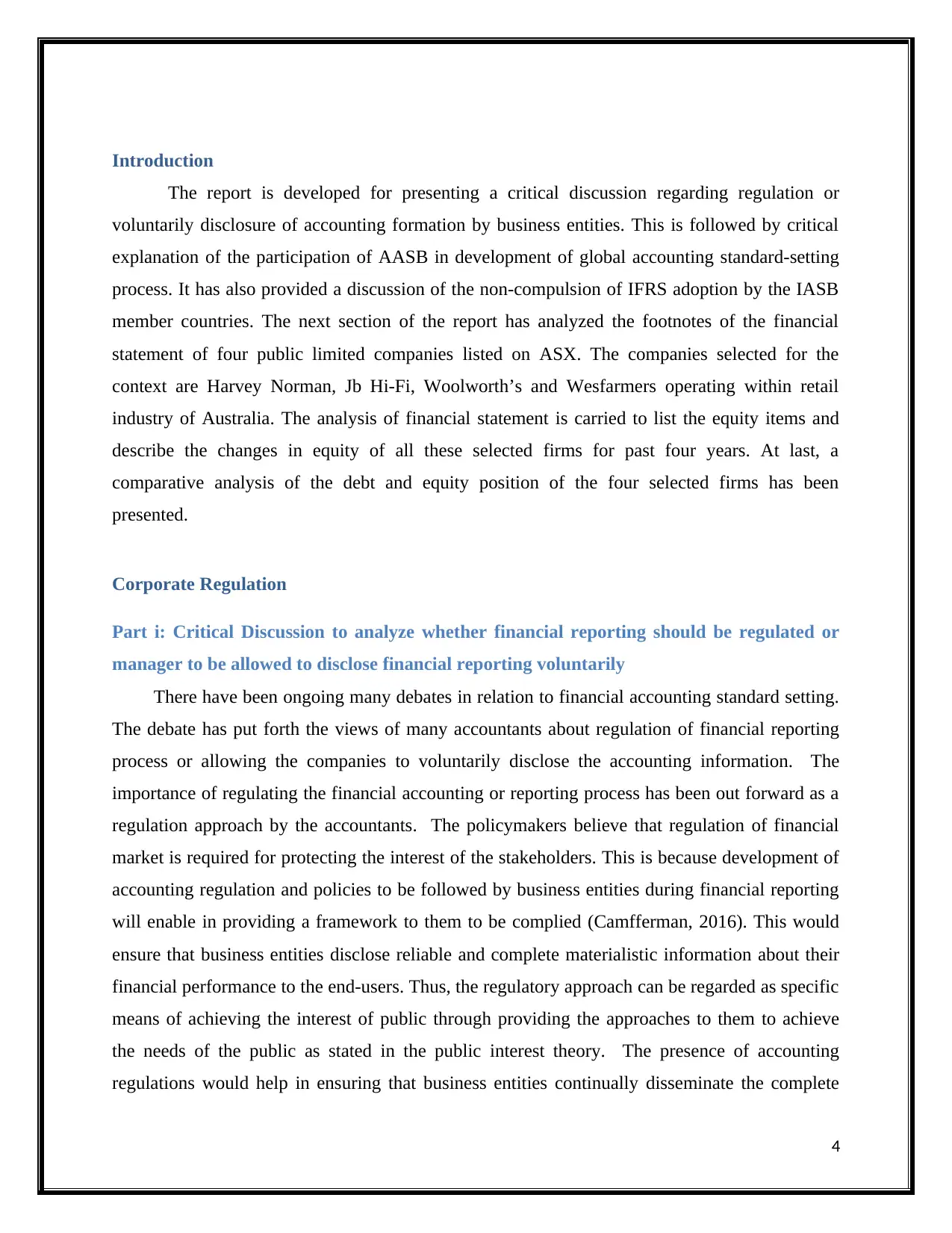
Introduction
The report is developed for presenting a critical discussion regarding regulation or
voluntarily disclosure of accounting formation by business entities. This is followed by critical
explanation of the participation of AASB in development of global accounting standard-setting
process. It has also provided a discussion of the non-compulsion of IFRS adoption by the IASB
member countries. The next section of the report has analyzed the footnotes of the financial
statement of four public limited companies listed on ASX. The companies selected for the
context are Harvey Norman, Jb Hi-Fi, Woolworth’s and Wesfarmers operating within retail
industry of Australia. The analysis of financial statement is carried to list the equity items and
describe the changes in equity of all these selected firms for past four years. At last, a
comparative analysis of the debt and equity position of the four selected firms has been
presented.
Corporate Regulation
Part i: Critical Discussion to analyze whether financial reporting should be regulated or
manager to be allowed to disclose financial reporting voluntarily
There have been ongoing many debates in relation to financial accounting standard setting.
The debate has put forth the views of many accountants about regulation of financial reporting
process or allowing the companies to voluntarily disclose the accounting information. The
importance of regulating the financial accounting or reporting process has been out forward as a
regulation approach by the accountants. The policymakers believe that regulation of financial
market is required for protecting the interest of the stakeholders. This is because development of
accounting regulation and policies to be followed by business entities during financial reporting
will enable in providing a framework to them to be complied (Camfferman, 2016). This would
ensure that business entities disclose reliable and complete materialistic information about their
financial performance to the end-users. Thus, the regulatory approach can be regarded as specific
means of achieving the interest of public through providing the approaches to them to achieve
the needs of the public as stated in the public interest theory. The presence of accounting
regulations would help in ensuring that business entities continually disseminate the complete
4
The report is developed for presenting a critical discussion regarding regulation or
voluntarily disclosure of accounting formation by business entities. This is followed by critical
explanation of the participation of AASB in development of global accounting standard-setting
process. It has also provided a discussion of the non-compulsion of IFRS adoption by the IASB
member countries. The next section of the report has analyzed the footnotes of the financial
statement of four public limited companies listed on ASX. The companies selected for the
context are Harvey Norman, Jb Hi-Fi, Woolworth’s and Wesfarmers operating within retail
industry of Australia. The analysis of financial statement is carried to list the equity items and
describe the changes in equity of all these selected firms for past four years. At last, a
comparative analysis of the debt and equity position of the four selected firms has been
presented.
Corporate Regulation
Part i: Critical Discussion to analyze whether financial reporting should be regulated or
manager to be allowed to disclose financial reporting voluntarily
There have been ongoing many debates in relation to financial accounting standard setting.
The debate has put forth the views of many accountants about regulation of financial reporting
process or allowing the companies to voluntarily disclose the accounting information. The
importance of regulating the financial accounting or reporting process has been out forward as a
regulation approach by the accountants. The policymakers believe that regulation of financial
market is required for protecting the interest of the stakeholders. This is because development of
accounting regulation and policies to be followed by business entities during financial reporting
will enable in providing a framework to them to be complied (Camfferman, 2016). This would
ensure that business entities disclose reliable and complete materialistic information about their
financial performance to the end-users. Thus, the regulatory approach can be regarded as specific
means of achieving the interest of public through providing the approaches to them to achieve
the needs of the public as stated in the public interest theory. The presence of accounting
regulations would help in ensuring that business entities continually disseminate the complete
4
Paraphrase This Document
Need a fresh take? Get an instant paraphrase of this document with our AI Paraphraser
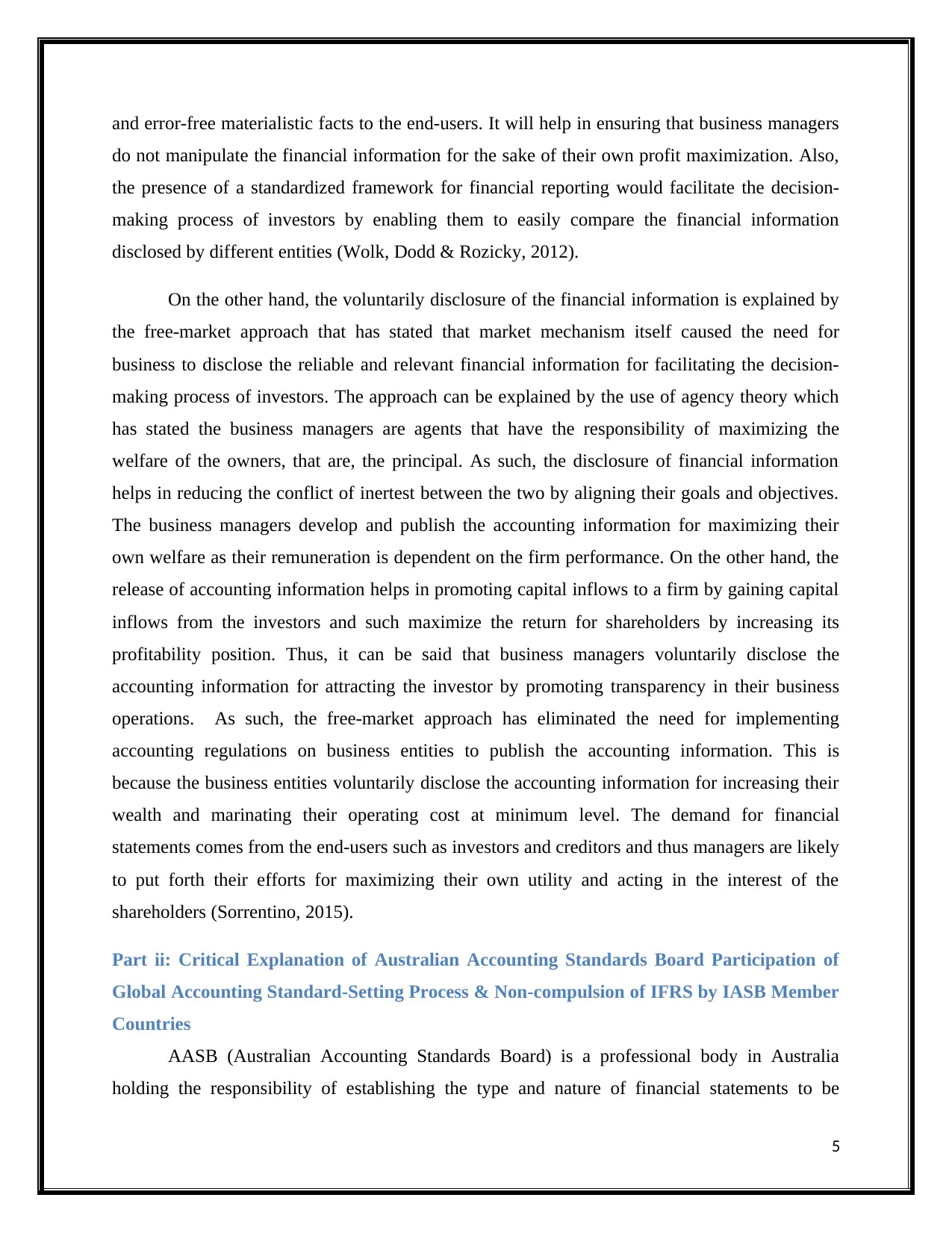
and error-free materialistic facts to the end-users. It will help in ensuring that business managers
do not manipulate the financial information for the sake of their own profit maximization. Also,
the presence of a standardized framework for financial reporting would facilitate the decision-
making process of investors by enabling them to easily compare the financial information
disclosed by different entities (Wolk, Dodd & Rozicky, 2012).
On the other hand, the voluntarily disclosure of the financial information is explained by
the free-market approach that has stated that market mechanism itself caused the need for
business to disclose the reliable and relevant financial information for facilitating the decision-
making process of investors. The approach can be explained by the use of agency theory which
has stated the business managers are agents that have the responsibility of maximizing the
welfare of the owners, that are, the principal. As such, the disclosure of financial information
helps in reducing the conflict of inertest between the two by aligning their goals and objectives.
The business managers develop and publish the accounting information for maximizing their
own welfare as their remuneration is dependent on the firm performance. On the other hand, the
release of accounting information helps in promoting capital inflows to a firm by gaining capital
inflows from the investors and such maximize the return for shareholders by increasing its
profitability position. Thus, it can be said that business managers voluntarily disclose the
accounting information for attracting the investor by promoting transparency in their business
operations. As such, the free-market approach has eliminated the need for implementing
accounting regulations on business entities to publish the accounting information. This is
because the business entities voluntarily disclose the accounting information for increasing their
wealth and marinating their operating cost at minimum level. The demand for financial
statements comes from the end-users such as investors and creditors and thus managers are likely
to put forth their efforts for maximizing their own utility and acting in the interest of the
shareholders (Sorrentino, 2015).
Part ii: Critical Explanation of Australian Accounting Standards Board Participation of
Global Accounting Standard-Setting Process & Non-compulsion of IFRS by IASB Member
Countries
AASB (Australian Accounting Standards Board) is a professional body in Australia
holding the responsibility of establishing the type and nature of financial statements to be
5
do not manipulate the financial information for the sake of their own profit maximization. Also,
the presence of a standardized framework for financial reporting would facilitate the decision-
making process of investors by enabling them to easily compare the financial information
disclosed by different entities (Wolk, Dodd & Rozicky, 2012).
On the other hand, the voluntarily disclosure of the financial information is explained by
the free-market approach that has stated that market mechanism itself caused the need for
business to disclose the reliable and relevant financial information for facilitating the decision-
making process of investors. The approach can be explained by the use of agency theory which
has stated the business managers are agents that have the responsibility of maximizing the
welfare of the owners, that are, the principal. As such, the disclosure of financial information
helps in reducing the conflict of inertest between the two by aligning their goals and objectives.
The business managers develop and publish the accounting information for maximizing their
own welfare as their remuneration is dependent on the firm performance. On the other hand, the
release of accounting information helps in promoting capital inflows to a firm by gaining capital
inflows from the investors and such maximize the return for shareholders by increasing its
profitability position. Thus, it can be said that business managers voluntarily disclose the
accounting information for attracting the investor by promoting transparency in their business
operations. As such, the free-market approach has eliminated the need for implementing
accounting regulations on business entities to publish the accounting information. This is
because the business entities voluntarily disclose the accounting information for increasing their
wealth and marinating their operating cost at minimum level. The demand for financial
statements comes from the end-users such as investors and creditors and thus managers are likely
to put forth their efforts for maximizing their own utility and acting in the interest of the
shareholders (Sorrentino, 2015).
Part ii: Critical Explanation of Australian Accounting Standards Board Participation of
Global Accounting Standard-Setting Process & Non-compulsion of IFRS by IASB Member
Countries
AASB (Australian Accounting Standards Board) is a professional body in Australia
holding the responsibility of establishing the type and nature of financial statements to be
5
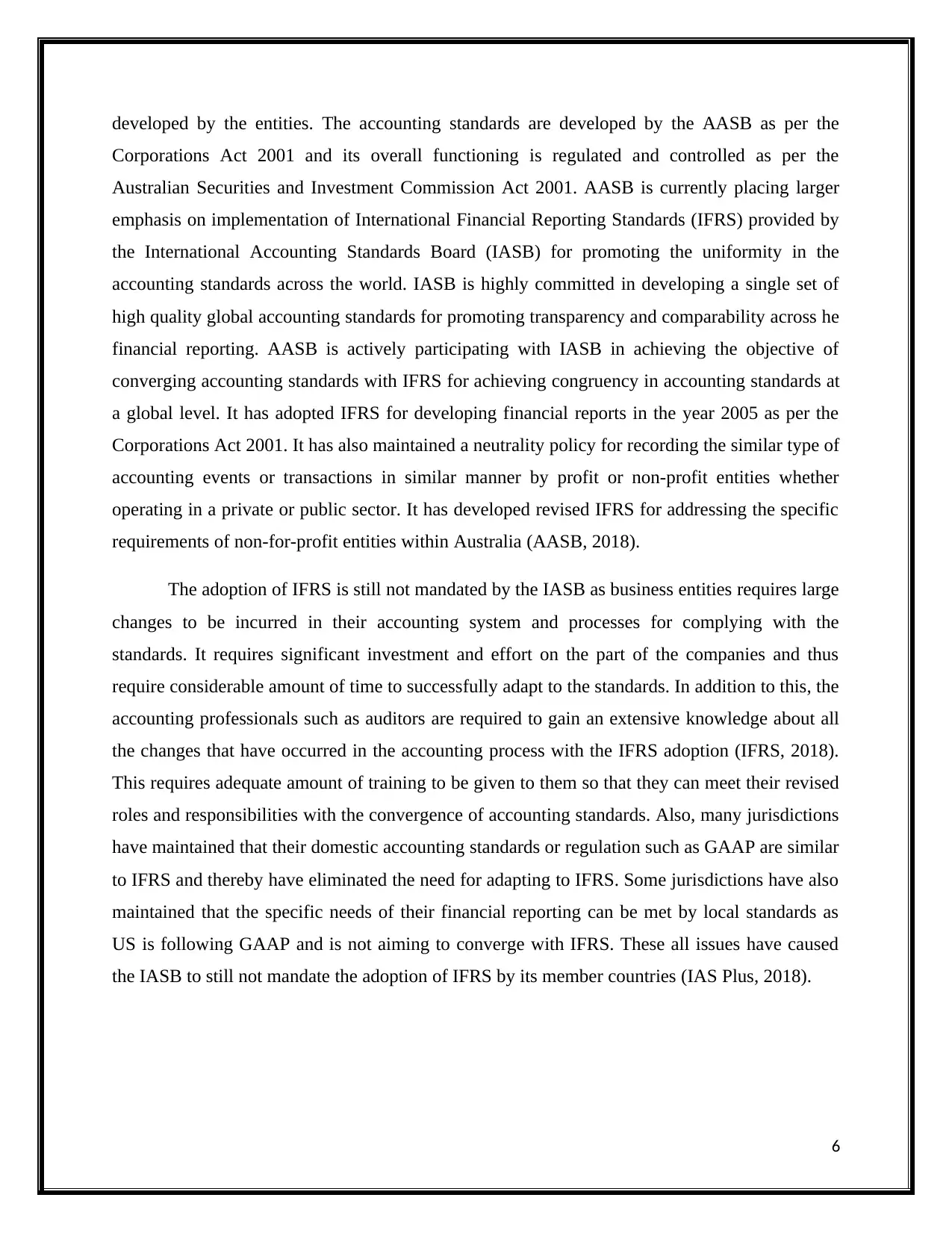
developed by the entities. The accounting standards are developed by the AASB as per the
Corporations Act 2001 and its overall functioning is regulated and controlled as per the
Australian Securities and Investment Commission Act 2001. AASB is currently placing larger
emphasis on implementation of International Financial Reporting Standards (IFRS) provided by
the International Accounting Standards Board (IASB) for promoting the uniformity in the
accounting standards across the world. IASB is highly committed in developing a single set of
high quality global accounting standards for promoting transparency and comparability across he
financial reporting. AASB is actively participating with IASB in achieving the objective of
converging accounting standards with IFRS for achieving congruency in accounting standards at
a global level. It has adopted IFRS for developing financial reports in the year 2005 as per the
Corporations Act 2001. It has also maintained a neutrality policy for recording the similar type of
accounting events or transactions in similar manner by profit or non-profit entities whether
operating in a private or public sector. It has developed revised IFRS for addressing the specific
requirements of non-for-profit entities within Australia (AASB, 2018).
The adoption of IFRS is still not mandated by the IASB as business entities requires large
changes to be incurred in their accounting system and processes for complying with the
standards. It requires significant investment and effort on the part of the companies and thus
require considerable amount of time to successfully adapt to the standards. In addition to this, the
accounting professionals such as auditors are required to gain an extensive knowledge about all
the changes that have occurred in the accounting process with the IFRS adoption (IFRS, 2018).
This requires adequate amount of training to be given to them so that they can meet their revised
roles and responsibilities with the convergence of accounting standards. Also, many jurisdictions
have maintained that their domestic accounting standards or regulation such as GAAP are similar
to IFRS and thereby have eliminated the need for adapting to IFRS. Some jurisdictions have also
maintained that the specific needs of their financial reporting can be met by local standards as
US is following GAAP and is not aiming to converge with IFRS. These all issues have caused
the IASB to still not mandate the adoption of IFRS by its member countries (IAS Plus, 2018).
6
Corporations Act 2001 and its overall functioning is regulated and controlled as per the
Australian Securities and Investment Commission Act 2001. AASB is currently placing larger
emphasis on implementation of International Financial Reporting Standards (IFRS) provided by
the International Accounting Standards Board (IASB) for promoting the uniformity in the
accounting standards across the world. IASB is highly committed in developing a single set of
high quality global accounting standards for promoting transparency and comparability across he
financial reporting. AASB is actively participating with IASB in achieving the objective of
converging accounting standards with IFRS for achieving congruency in accounting standards at
a global level. It has adopted IFRS for developing financial reports in the year 2005 as per the
Corporations Act 2001. It has also maintained a neutrality policy for recording the similar type of
accounting events or transactions in similar manner by profit or non-profit entities whether
operating in a private or public sector. It has developed revised IFRS for addressing the specific
requirements of non-for-profit entities within Australia (AASB, 2018).
The adoption of IFRS is still not mandated by the IASB as business entities requires large
changes to be incurred in their accounting system and processes for complying with the
standards. It requires significant investment and effort on the part of the companies and thus
require considerable amount of time to successfully adapt to the standards. In addition to this, the
accounting professionals such as auditors are required to gain an extensive knowledge about all
the changes that have occurred in the accounting process with the IFRS adoption (IFRS, 2018).
This requires adequate amount of training to be given to them so that they can meet their revised
roles and responsibilities with the convergence of accounting standards. Also, many jurisdictions
have maintained that their domestic accounting standards or regulation such as GAAP are similar
to IFRS and thereby have eliminated the need for adapting to IFRS. Some jurisdictions have also
maintained that the specific needs of their financial reporting can be met by local standards as
US is following GAAP and is not aiming to converge with IFRS. These all issues have caused
the IASB to still not mandate the adoption of IFRS by its member countries (IAS Plus, 2018).
6
⊘ This is a preview!⊘
Do you want full access?
Subscribe today to unlock all pages.

Trusted by 1+ million students worldwide
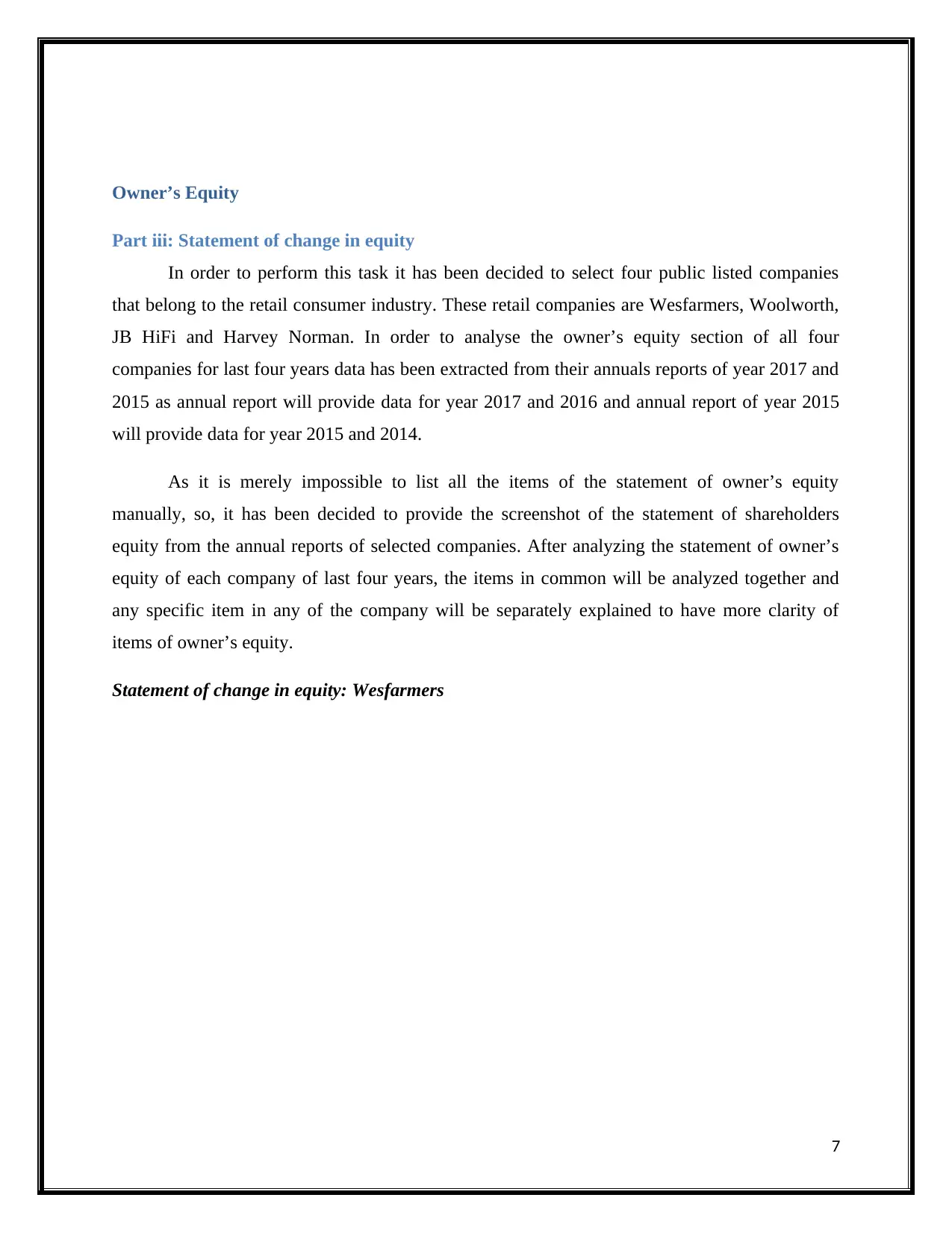
Owner’s Equity
Part iii: Statement of change in equity
In order to perform this task it has been decided to select four public listed companies
that belong to the retail consumer industry. These retail companies are Wesfarmers, Woolworth,
JB HiFi and Harvey Norman. In order to analyse the owner’s equity section of all four
companies for last four years data has been extracted from their annuals reports of year 2017 and
2015 as annual report will provide data for year 2017 and 2016 and annual report of year 2015
will provide data for year 2015 and 2014.
As it is merely impossible to list all the items of the statement of owner’s equity
manually, so, it has been decided to provide the screenshot of the statement of shareholders
equity from the annual reports of selected companies. After analyzing the statement of owner’s
equity of each company of last four years, the items in common will be analyzed together and
any specific item in any of the company will be separately explained to have more clarity of
items of owner’s equity.
Statement of change in equity: Wesfarmers
7
Part iii: Statement of change in equity
In order to perform this task it has been decided to select four public listed companies
that belong to the retail consumer industry. These retail companies are Wesfarmers, Woolworth,
JB HiFi and Harvey Norman. In order to analyse the owner’s equity section of all four
companies for last four years data has been extracted from their annuals reports of year 2017 and
2015 as annual report will provide data for year 2017 and 2016 and annual report of year 2015
will provide data for year 2015 and 2014.
As it is merely impossible to list all the items of the statement of owner’s equity
manually, so, it has been decided to provide the screenshot of the statement of shareholders
equity from the annual reports of selected companies. After analyzing the statement of owner’s
equity of each company of last four years, the items in common will be analyzed together and
any specific item in any of the company will be separately explained to have more clarity of
items of owner’s equity.
Statement of change in equity: Wesfarmers
7
Paraphrase This Document
Need a fresh take? Get an instant paraphrase of this document with our AI Paraphraser
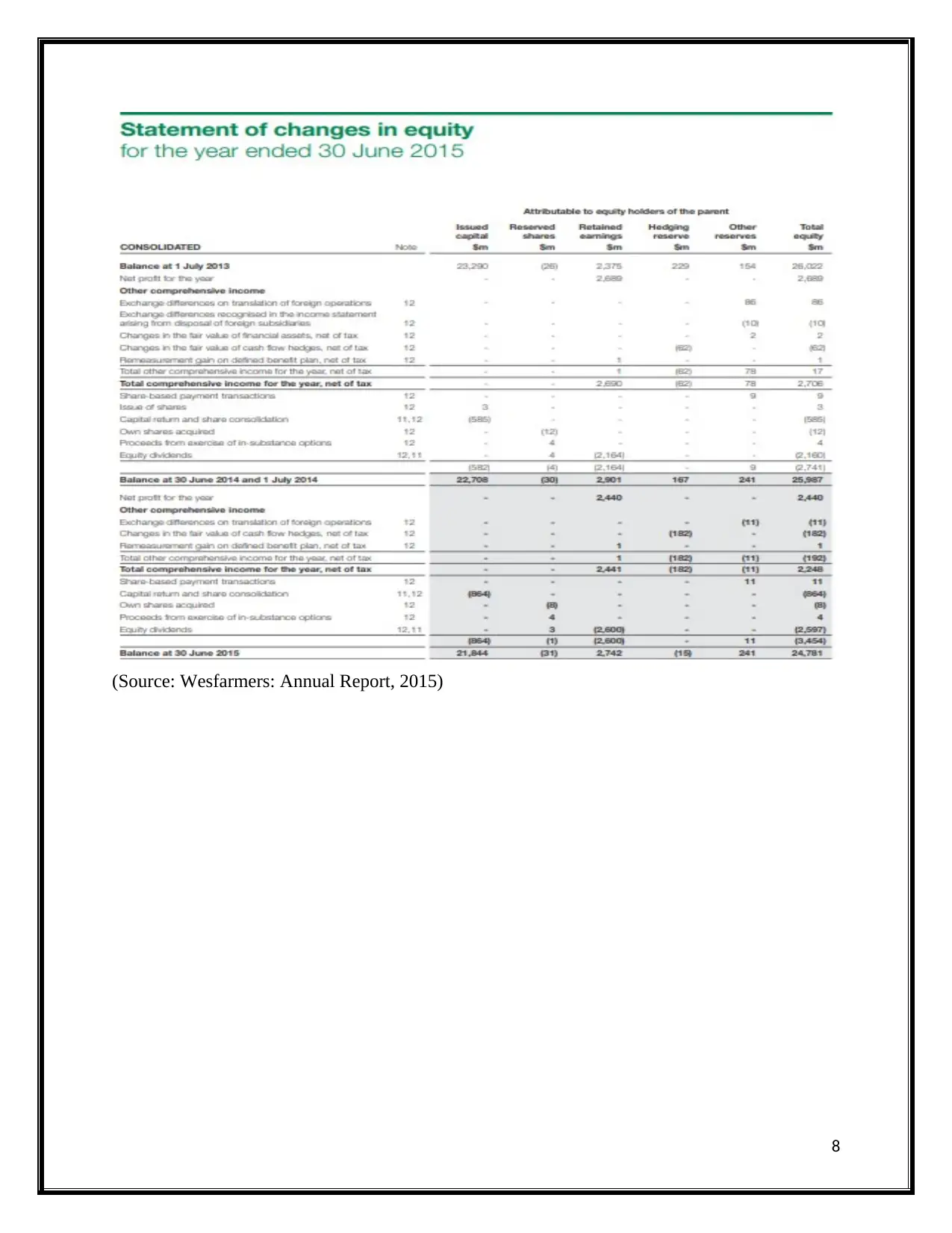
(Source: Wesfarmers: Annual Report, 2015)
8
8
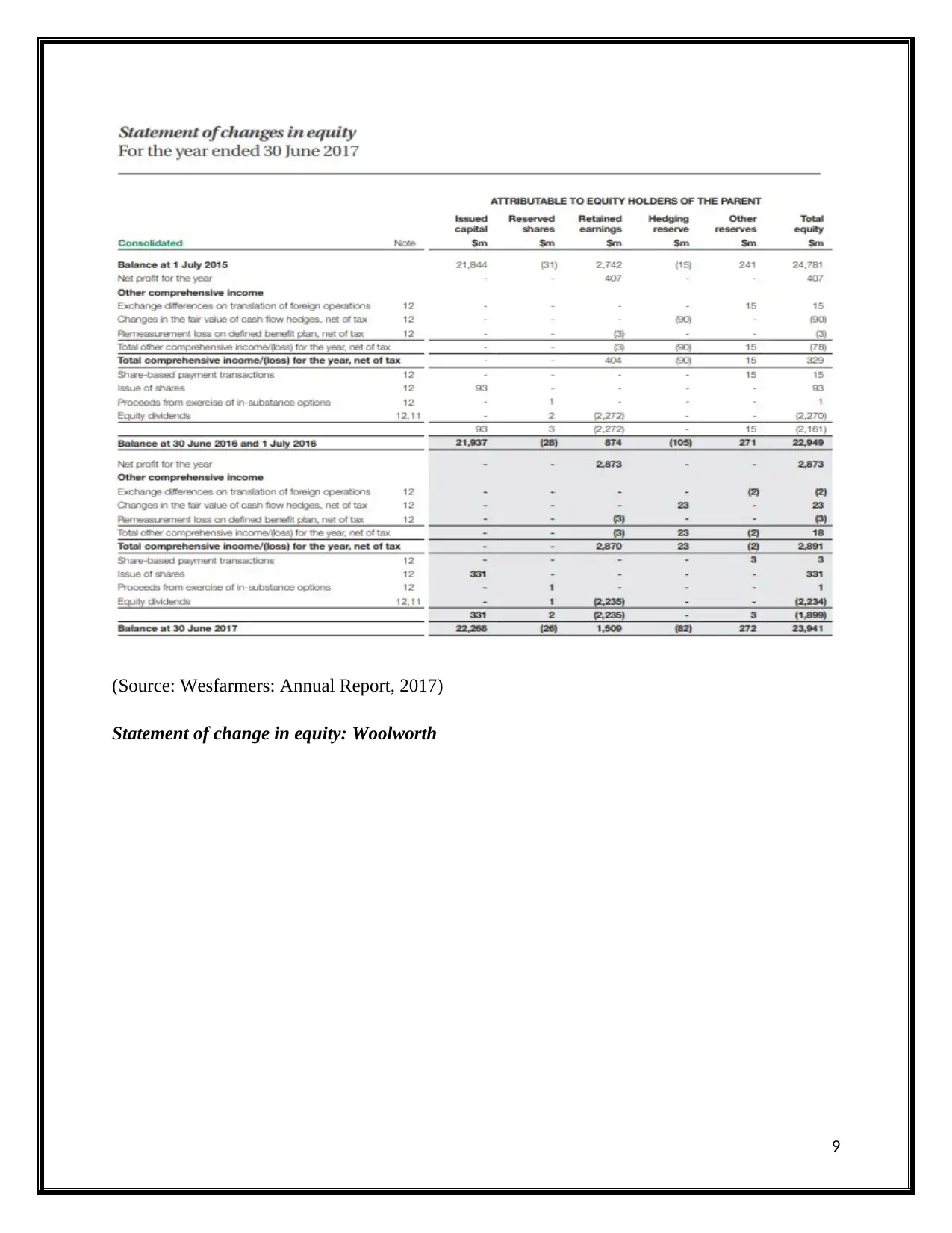
(Source: Wesfarmers: Annual Report, 2017)
Statement of change in equity: Woolworth
9
Statement of change in equity: Woolworth
9
⊘ This is a preview!⊘
Do you want full access?
Subscribe today to unlock all pages.

Trusted by 1+ million students worldwide
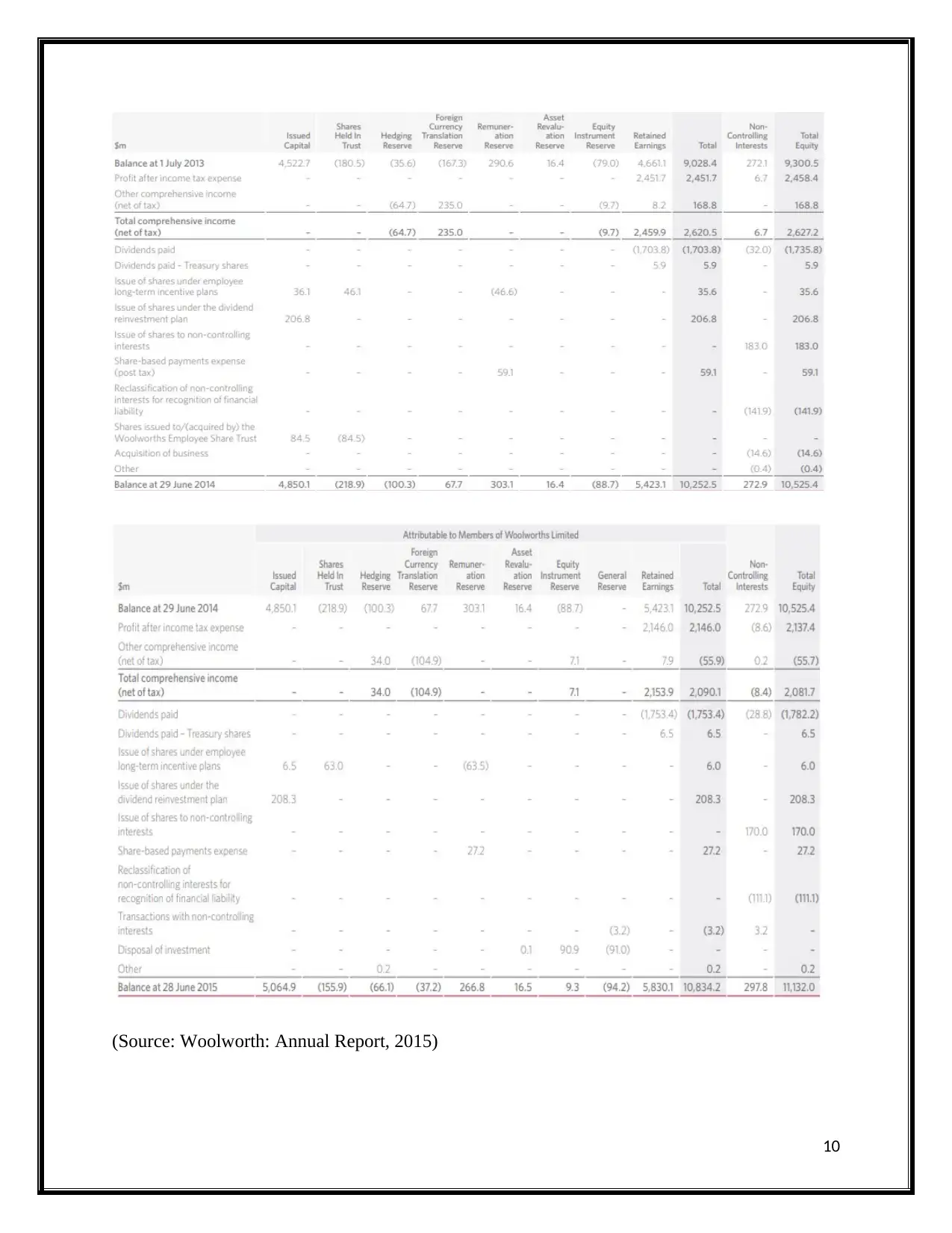
(Source: Woolworth: Annual Report, 2015)
10
10
Paraphrase This Document
Need a fresh take? Get an instant paraphrase of this document with our AI Paraphraser
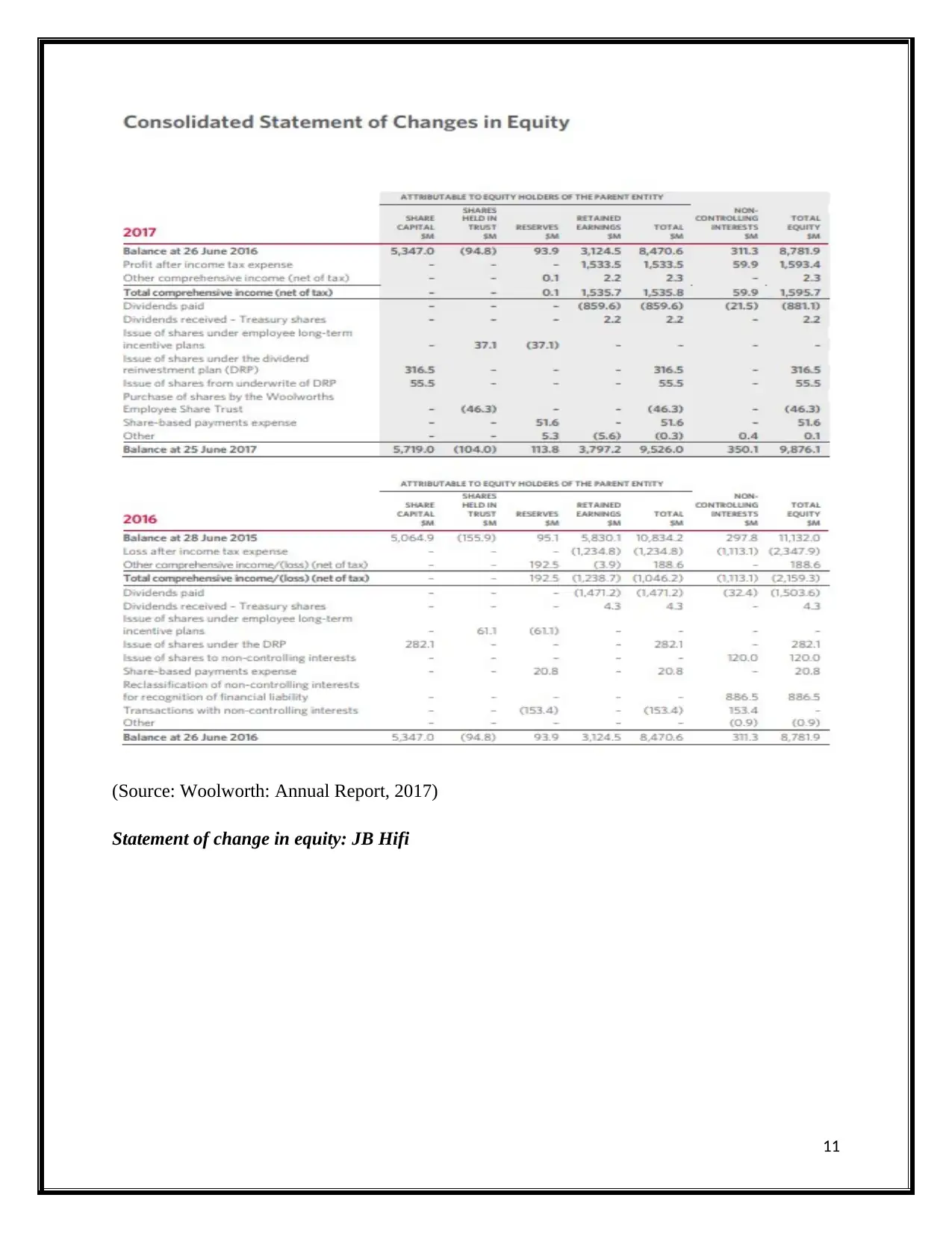
(Source: Woolworth: Annual Report, 2017)
Statement of change in equity: JB Hifi
11
Statement of change in equity: JB Hifi
11
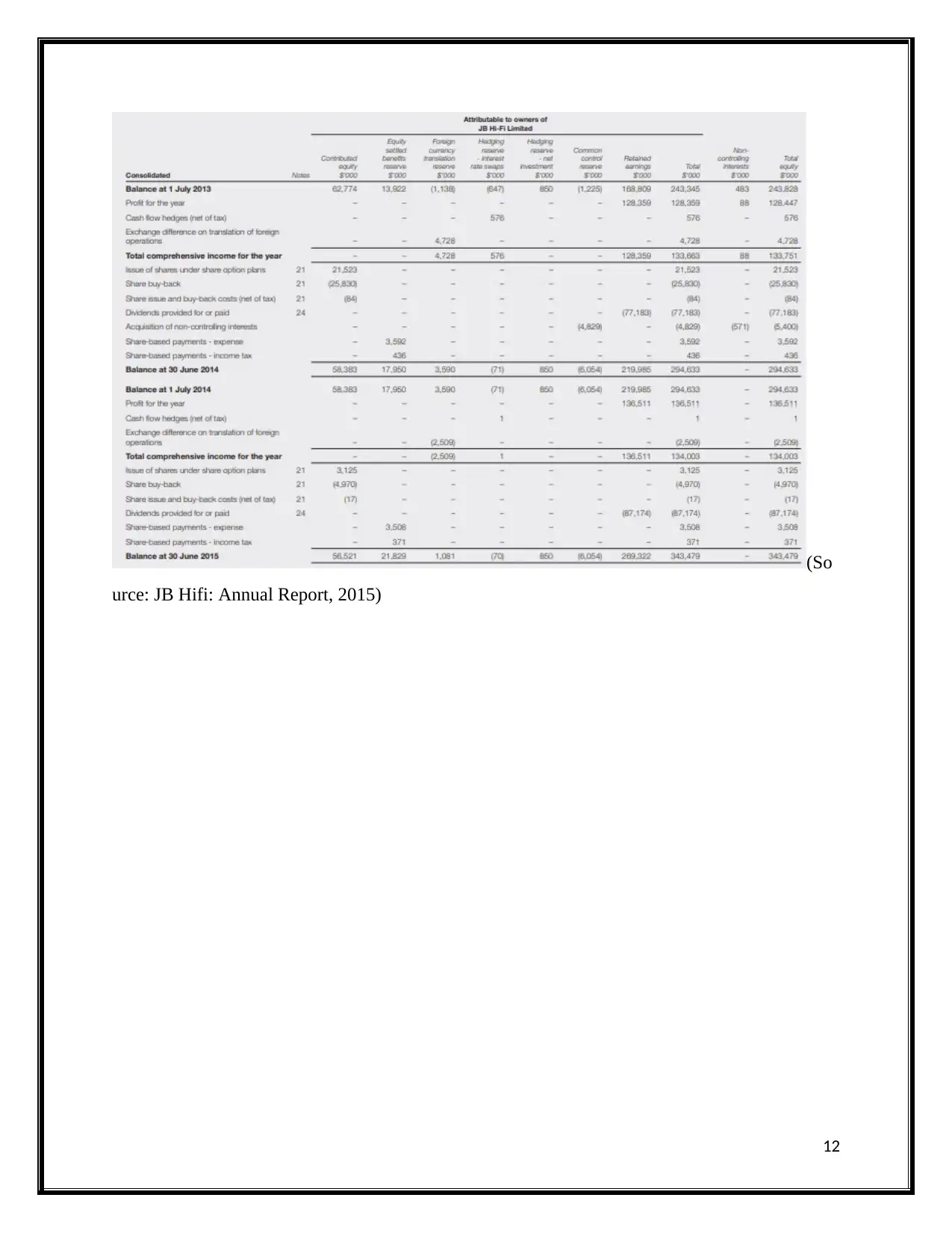
(So
urce: JB Hifi: Annual Report, 2015)
12
urce: JB Hifi: Annual Report, 2015)
12
⊘ This is a preview!⊘
Do you want full access?
Subscribe today to unlock all pages.

Trusted by 1+ million students worldwide
1 out of 20
Related Documents
Your All-in-One AI-Powered Toolkit for Academic Success.
+13062052269
info@desklib.com
Available 24*7 on WhatsApp / Email
![[object Object]](/_next/static/media/star-bottom.7253800d.svg)
Unlock your academic potential
Copyright © 2020–2026 A2Z Services. All Rights Reserved. Developed and managed by ZUCOL.




